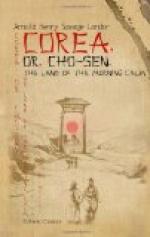CHAPTER XVI
Executions—Crucified and carried through the streets—The execution ground—Barbarous mode of beheading—Noble criminals—Paternal love—Shut out—Scaling the wall—A catastrophe—A nightmare.
In Cho-sen, as in other countries, we find not only pleasanter sights, but also those that are disagreeable or even revolting. That which I am about to describe is one which, I have little doubt, will make your blood curdle, but which is none the less as interesting as some of the others I have feebly attempted in this work to describe; I mean an execution as carried out in the Land of the Morning Calm. The penal form of death adopted is beheading, which is not, I believe, so pleasant a sensation as, for instance, that of being hanged—that is, when other persons are the sufferers. Of late years, executions have not been by any means an everyday occurrence in Corea, but here, as in other countries, there is always to be found a good share of people who are anxious to be “off” their heads. There is no reason why people should commit crimes, yet they do commit them and get punished in consequence. They are punished in this world for having broken the limits of society’s laws, and yet again, if what one hears is correct, they are punished wherever they happen to go after their final departure from our very earthly regions. In Corea, as is the case all over the far East, the natives are not much concerned about this future existence and attach little importance to death and physical pain. I have no doubt, in fact I am positive, that the Eastern people feel pain much less than we do, partly because they are accustomed from childhood to be insensitive to bodily agony, but chiefly because they are differently constituted to us. In our case, the brain, by means of which it is that we judge of the amount of pain inflicted on us, has been trained to receive impressions so quickly, transmitted as they are in an instant from any part of the body to the centre of our system, that, indeed, many times we actually feel the pain before it has been physically communicated to us at all. With the Corean, as with the Manchu or the Chinese, a reverse action takes place. With them, the brain works so very slowly that, supposing a bad ache is taking place in any part of the body, whence is being conveyed to the drowsy brain the unpleasant news of the agony that that part is undergoing; well, what in that case happens in the Corean skull? By the time the brain has grasped the idea that the aforesaid part of the body is really in a state of suffering, the pain is almost gone. This, roughly stated, is I believe, a truthful explanation of their going to death with so much bravery.




